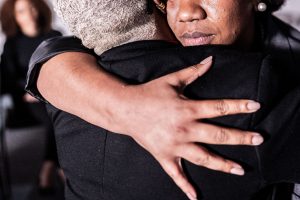ableism (noun): discrimination or prejudice against individuals with disabilities.
Whatever your personal feelings about the pandemic, I assume most of us have been happy to see the resumption of a growing number of face-to-face meetings. For health reasons, I’ve elected to continue going to virtual meetings, but I don’t begrudge the fellows returning to live settings. Rather, I’m thrilled for them, and I’m particularly grateful to all the tech-savvy folks who have made hybrid meetings possible.
That said, there is a subtle ableism going on at some meetings that’s become troubling: it’s the encouragement that more fellows should return to face-to-face meetings because they offer better or greater or “more real” recovery. Of course, this often came with the caveat of exempting those with health conditions for whom exposure to Covid (and subsequent viruses) would be more dangerous, but for me, it comes with a definite “separate-but-equal” vibe.
Ableism, unfortunately, isn’t a new phenomenon in OA. Our literature talks about how recovery restores us to “good health” and “healthy bodies,” ignoring the fact that, for many of us with disabilities and chronic illnesses, our health and bodies will remain compromised regardless of our being restored to sanity around food and eating behaviors.
Our literature talks about how recovery restores us to “good health” and “healthy bodies,” ignoring the fact that, for many of us with disabilities and chronic illnesses, our health and bodies will remain compromised regardless of our being restored to sanity.
I attended my first OA Birthday celebration twenty-three years ago when I was still fairly new in program. At one point during the Saturday night keynote, the speaker had the whole room laughing about how humiliating it had been to be forced to take adaptive gym with the “crippled kids.” Suddenly, I was all alone in a room full of hundreds of people. I had the opportunity to talk with this speaker privately a few days later. He apologized and thanked me for bringing it to his attention.
Sadly, I’ve heard many OA speakers express the same idea: humiliation over being lumped together with disabled people. They often rationalize using this example by explaining that, while it’s not disabled kids’ fault that they have to take adaptive gym, these speakers brought the humiliation on themselves by overeating (though I’m never sure how this rationalization comports with being powerless over food). The ableist construct that face-to-face meetings are inherently better or offer stronger recovery than virtual meetings is echoed in this similar acknowledgement that what’s available to disabled or chronically ill people is merely a reasonable facsimile of “the real thing.”
Sadly, I’ve heard many OA speakers express the same idea: humiliation over being lumped together with disabled people.
I’m sure that some people who are sticking with virtual meetings are doing so out of convenience (the antithesis of “going to any length” (Alcoholics Anonymous, Fourth Edition, p. 58)). I’m guilty myself of occasionally multitasking during meetings, and I generally keep my camera off unless I’m speaking. That said, however, who’s to say why an individual chooses virtual over face-to-face meetings or whether that person has a legitimate reason to do so?
Many speakers with long-term abstinence talk about how it took years for them to fully commit to our program of recovery, saying they did the best they could in the beginning, and were led to freedom from the bondage of food in God’s time. Most also express gratitude that they were welcomed without judgment in those early days.
It’s true that there’s undeniable value in suiting up and showing up for face-to-face meetings when that option is appropriate and safe. But consistent comments about the superiority of those meetings versus meetings held virtually is problematic. It places the recovery of those unable or unwilling to attend in-person meetings on a lower rung of some imagined ladder of worth and does not serve the OA Fellowship as a whole.
—K.S., California USA





